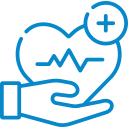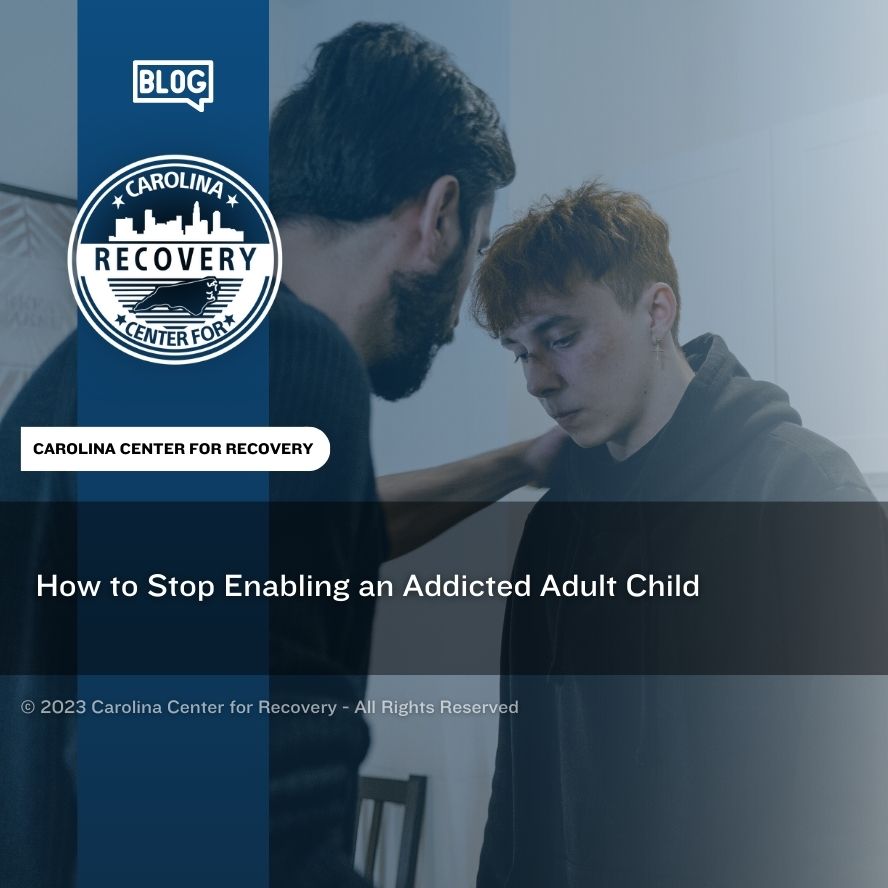Loving someone who struggles with substance abuse or addiction can be challenging. It can be especially difficult for parents to watch an addicted child as they sink deeper into drug or alcohol abuse.
Parents can often force minor children into treatment, even if they do not want to go. But what can parents of an addicted adult child do to help?
Parents of addicted adult children do not always have the same options as parents of minors. However, there are steps they can take to encourage their children to seek treatment. One of the most important things you can do is to recognize and stop enabling behaviors.
This article will detail how to stop enabling an adult child with addiction.
What you will learn:
- What enabling is
- How enabling can be harmful
- How to recognize enabling behaviors
- Strategies to stop enabling your grown child
- Where to find treatment and support
If you need treatment, support, or guidance, contact the specialists at the Carolina Center for Recovery. Our team will connect you to the resources you need or help you schedule an intake appointment.
What is Enabling?
Enabling means behaving in a way that prevents another person from experiencing the consequences of their decisions or behaviors. Enabling includes:
- Intervening to prevent or reduce the impact of a person’s behaviors
- Avoiding discussion about problematic behaviors
- Making excuses for a person’s choices or behaviors
Enabling is common in families with codependency. Parents or other family members may enable someone living with addiction. For instance, if an adult child loses their job because of substance use, parents may enable them by paying the rent. Allowing the child to live at home rent-free may also be an enabling behavior.
Parents typically enable their children from a place of love or concern. However, these behaviors can actually allow substance abuse or addiction to get worse. It is important to recognize these behaviors and stop enabling your child.
How to Recognize Signs That You Are Enabling Your Adult Child
Watching your child struggle with addiction can cause a flood of feelings. You may worry, feel angry, or experience guilt and shame about their substance abuse.
Enabling your child can also lead to complex emotions. You may resent your child, feel that they are entitled or ungrateful, or feel overwhelmed much of the time.
Enabling is exhausting because it requires you to take on the weight of your child’s actions. Instead of your child bearing this burden, you deal with the stress.
Here are some common signs that you may be enabling your loved one:
- You allow your adult child to live with you without contributing to the household
- You bail your adult child out of jail
- You give your child money to buy drugs or alcohol because you are afraid of how they will get them if you do not
- You make excuses for their substance use
- You deny they have a problem when talking to others
- You neglect your own needs or put off your own goals to cater to your adult child
- You pay for their expenses
It can be very challenging to recognize these and other behaviors as enabling. Many parents engage in these behaviors out of love or concern.
However, drug and alcohol abuse changes people’s behaviors. As your child sinks deeper into substance abuse and behaves in destructive ways, you must change your approach, too.
How to Stop Enabling an Addict
Learning new strategies can stop parents’ enabling behaviors and create a healthier family dynamic that supports recovery. The journey will not be easy, but the end result will be worth the effort.
Here are some ways you can stop enabling your loved one’s addiction.
Educate Yourself
Learn about addiction as a disease. Read about how addiction can affect people’s thoughts, feelings, and behaviors. This can help you recognize how you may be enabling your adult child.
Get support
Find the support you need to navigate this incredibly challenging situation. Join Al-Anon or other support groups. Find an addiction counselor or attend regular therapy sessions. Taking care of your mental health can help you support your addicted loved one.
Set boundaries
Work with a counselor or addiction specialist to develop firm boundaries. They might include:
- Cutting off financial support
- Requiring your child to seek help in a treatment facility to continue living in your home
- Not allowing your child to use drugs or alcohol in your home
- Banning people who abuse drugs from your home
- Refusing to bail your child out of jail
Communicate these boundaries to your child and stick to them. Setting clear boundaries and maintaining them may encourage your child to seek treatment.
Find Support Now
If you or someone you love struggles with substance use disorder (SUD), help is available. Effective treatment is available at the Carolina Center for Recovery. Contact our intake specialists now to learn about our holistic treatment and support programs or to schedule an intake evaluation.










